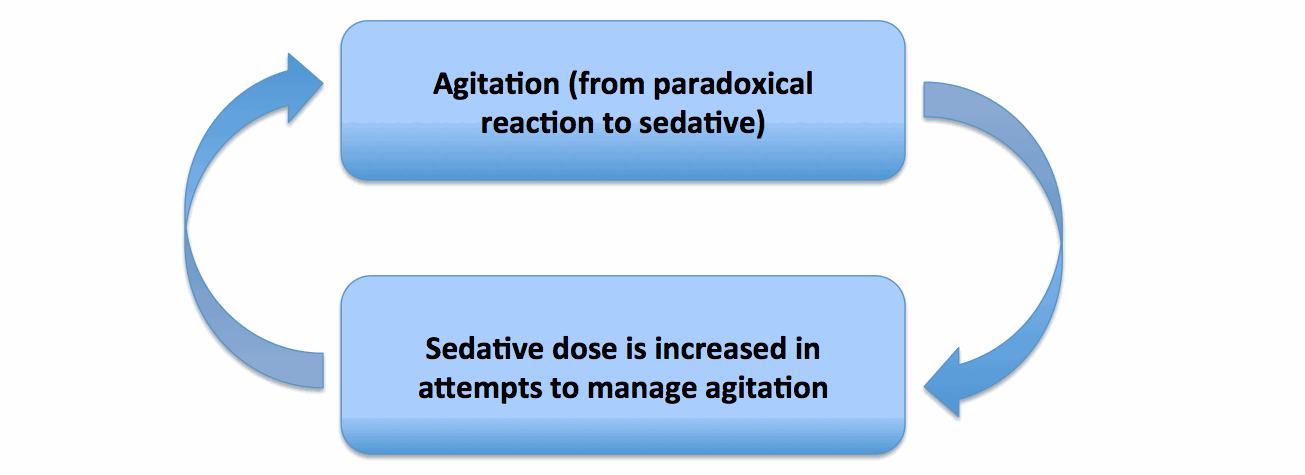A paradoxical reaction (PR) happens when a person experiences the opposite of what the drug is intended to do. If a patient responds to medication in a contradictory or opposite way to what is expected, it is said to have had a paradoxical effect. An example of this is pain relief medication causing increased pain. Benzodiazepine (BZ) treatment can sometimes result in paradoxical reactions in susceptible individuals causing an increase in anxiety, agitation, hallucinations at the onset of sleep, aggressiveness, hyperactivity, irritability, hyperactive behavior, insomnia and exacerbation of seizures in epileptics. Tolerance and withdrawal can sometimes feel like paradoxical reactions, but this is often not a true paradoxical reaction by definition.
Central features of paradoxical reactions (PRs) are emotional lability, agitation, excessive movement, and confusion. This may be associated with increased autonomic activity including tachycardia, hypertension, and tachypnea. Unfortunately, there is no uniform definition of a PR.
Attacks of rage and violent behavior, including assault (and even homicide), have been reported, particularly after intravenous administration but also after oral administration. Less dramatic increases in irritability and argumentativeness are much more common and are frequently remarked upon by patients or by their families. Such reactions are similar to those sometimes provoked by alcohol. They are most frequent in anxious and aggressive individuals, children, and the elderly. Cases of “baby-battering”, wife-beating and “grandma-bashing” have been attributed to BZ paradoxical reactions.
The rate of PRs following benzodiazepine administration is estimated to be 1-2% (Tae 2014). Risk factors for developing a PR from benzodiazepines include alcoholism, extremes of age, and psychiatric comorbidity. The neurobiology of paradoxical reactions is unclear. Genetic variability may play a part in some idiosyncratic reactions. One report worth noting documented a pair of identical twins who both experienced dramatic reactions to midazolam (Short 1987). The association between an increased rate of PR in people with alcoholism might relate to changes in GABA receptors and GABAergic pathways induced by alcoholism (e.g. differences in receptor subunit composition; Bhandage 2014). See also: KINDLING
The most important aspect of managing paradoxical reactions to benzodiazepines is to recognize or identify they are occurring, and then to discontinue the drug. This can be tricky in people who are having paradoxical reactions and who are also physically dependent on the benzodiazepines because it is often an issue of figuring out what is causing what (between the withdrawal syndrome and the PR) and then determining how to stop the offending agent (the BZ) and manage the severe withdrawal syndrome simultaneously (e.g., someone who seemingly tolerated the benzodiazepine prior, but after the onset of a withdrawal syndrome from, say, partially tapering the dose they became sensitized to the drug and experienced a PR on up-titration in an attempt to correct or stabilize from the over-rapid dose reduction. Or, sometimes people who tolerated BZ prior are in the midst of a cold-turkey withdrawal and then try to reinstate the BZ in an attempt to get relief from the withdrawal syndrome, only to have a paradoxical reaction on reinstatement).
Failure to diagnose that the patient is experiencing a PR may lead to a progressive increasing of the benzodiazepine dose, in an attempt to “control” the emerging symptoms of the PR, leading to the opposite of what is expected–which is an increase or worsening of the PR symptoms, as opposed to their improvement.
